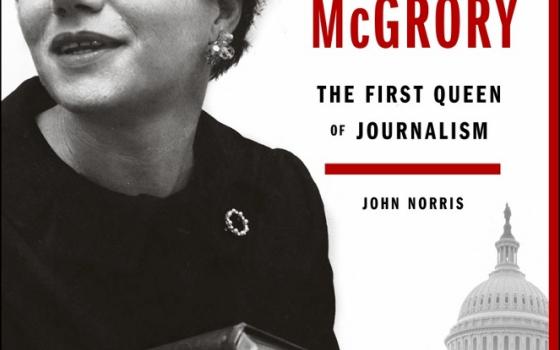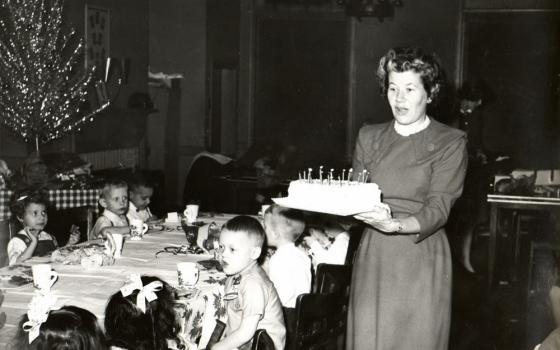In the rapidly changing nature of journalism in the Internet era, once-dominant reporters and commentators are quickly forgotten.
That, of course, is the risk journalists take on careers based on the immediacy of events and trends and issues that seem important at the time but are quickly scattered to the winds of the ephemeral.
The speed of being forgotten is now accelerated. Look at onetime giants like Walter Lippmann, the much praised, influential and quoted American columnist and éminence grise from the 1930s through the 1970s. He is now barely mentioned.
Let's hope that fate does not befall Mary McGrory (1918-2004), the subject of a new biography and a figure who should be of more than passing interest to readers of GSR.
This longtime syndicated columnist for The Washington Star and later The Washington Post was famously Roman Catholic and proud to the bones of her Irish-American heritage. Her story, as recounted in the new biography Mary McGrory: The First Queen of Journalism by John Norris, includes a close link to Catholic sisters who, by all accounts, grounded McGrory spiritually.
McGrory rose from the ranks of papers in her native Boston and in Washington to land a plumb assignment at a relatively young age: covering national politics at a time when there were few women in what was then called the press corps.
As Norris' biography makes clear, this trailblazer was a reporter of the old school. A legendary hard worker, McGrory was relentless. She hustled. Though she knew how to work the phones and had some of the best sources around Washington, McGrory was committed to reporting on what she saw. That meant logging long hours in Capitol Hill hearing rooms or on the campaign trail when covering national campaigns actually meant something. One of her first assignments was covering the Army-McCarthy hearings in 1954 for the Washington Star, which had hired her in 1947. She stayed at the Star until it closed in 1981 and spent the rest of her career at The Washington Post.
The book only hints at the quality of McGrory's writing, which was uniformly fine. Her tribute to the slain President John F. Kennedy won universal acclaim, including praise by Jacqueline Kennedy. (A sample of McGrory's writing is contained in the 2006 collection of columns The Best of Mary McGrory: A Half-Century of Washington Commentary.)
Though McGrory never hid her sympathies — not surprisingly, as a Boston native, she was a pro-Kennedy liberal — she also was not afraid to jostle those she agreed with, including Robert Kennedy, President Lyndon B. Johnson and Eugene McCarthy. Her relationships with all three men were complex.
She publicly rebuked Robert Kennedy for not initially entering the 1968 presidential race, though she remained on good, personal terms with the New York senator until his untimely death later that year. She angered LBJ, including through her opposition to the Vietnam War, though not enough for the president to make an ill-considered sexual advance on McGrory that she wisely spurned. (McGrory, who never married, told him, "I admire you, Mr. President, and I always will. And I think you are doing a terrific job, and that is where it stops — right there.")
The book also hints of a possible romantic relationship between McGrory and McCarthy, though the late Minnesota senator does not come off well in the biography, portrayed as narcissistic, insensitive and flinty.
Though McGrory could summon praise for Republicans — she liked President George H.W. Bush for a time — she was acidic when it came to assessing her old nemesis, President Richard Nixon. (McGrory's Watergate-era commentary won McGrory her only Pulitzer Prize, and she had the distinction of making the Nixon White House's infamous enemies list.) When Nixon lost the 1962 election for California governor and blamed the press for his defeat, McGrory began a column, "For Richard M. Nixon, it was exit snarling." Similarly, Nixon's 1974 resignation prompted this cool assessment: "Richard Nixon's small store of pity had always been reserved for himself." Overall, McGrory was fond of saying of Nixon: "If he were a horse, I should not buy him."
Though this biography is necessarily concerned with McGrory and those she covered in the realm of politics, it is also revealing about her religious and inner life.
"Although Mary fit in with reporters," Norris writes — and at the time, that meant a predominately male crowd — "her Catholicism set her slightly apart from the rest of the breed."
"Mary's faith was absent from her columns but it shaped her far more than most of her readers, and even many of her friends, appreciated. Her faith was her moral center," Norris writes. He quotes fellow columnist Anthony Lewis, who observed, "Mary was so wonderfully caustic and funny about life that it probably didn't occur to most of us that she was deeply religious. It was an anomaly among that group of people."
Norris said while McGrory was "reluctant to impose her view of religion on others," she combined "distinct strains of liberation theology" with a very traditional type of religious practice.
"She prayed on her knees every night before bed," he writes. "She almost never missed a Sunday Mass. She felt that the entire point of religion was to assist the oppressed and less fortunate — something in which she thought the Church often fell criminally short. Mary saw social justice as the cornerstone of responsible Catholicism and believed in a God of love and compassion."
Her relationship with Catholic sisters makes for a touching part of McGrory's life story. For years, she was a volunteer at St. Ann's Infant and Maternity House, a Washington, D.C., orphanage for unwed mothers and their children. Her relationship with sisters there became a real source of personal grounding for McGrory.
As Norris tells it, the relationship started early in McGrory's Washington career, in the 1950s. As someone who had "an abiding belief in the importance of doing good works," McGrory visited St. Ann's to see if the orphanage needed a volunteer. The sisters had never had such a request and weren't sure what to do, Norris writes. Just as the sisters started to say "no," a boy "clambered into Mary's lap. With upturned eyes, he asked Mary if she was going to stay the night. St. Ann's had its first volunteer."
Some of her relationships with the sisters touched on deeply personal matters. For years, McGrory had an on-again, off-again romantic relationship with a married television producer and political operative named Blair Clark. An intensely private person, McGrory confided in few people about the romance. One of the few who knew was Sister Editha, who for years headed St. Ann's. As the biography makes clear, Sister Editha disapproved of the relationship for a number of reasons — she counseled McGrory that it was not wise to see a married man. She also felt that Clark had mistreated McGrory, and Sister Editha didn't like to see her friend (and star volunteer) hurt.
This is only a small portion of the book — the biography is more expansive in noting McGrory's generosity and her love of volunteering at the orphanage.
"Mary invested time and money at St. Ann's," Norris notes. "She bought the kids Christmas presents, paid private school tuition for some of the children, helped out some of the young mothers and staff at St. Ann's financially, and wrote checks to the orphanage when there were budget shortfalls." She also saw to it that the children enjoyed regular poolside outings to Hickory Hill, the home of Robert Kennedy's family.
Rita Markley, who once lived at the orphanage, "marveled that Mary had kept up her work with disadvantaged kids for decades without ever becoming tedious or dull — 'because that wasn't who she was,' " writes Norris, who goes on to note that Markley says McGrory helped her understand "the difference that 'one person seeing you can make in a life.' "
McGrory suffered a stroke in 2003, and before her death a year later, St. Ann's Sr. Josephine Murphy saw McGrory during one of her last outings to the orphanage. A boy who had earlier overcome a speech impediment with McGrory's encouragement sat on her lap.
"When I couldn't read and I needed help, Mary Gloria was here for me," he told the sister, using the name the children embraced because they couldn't pronounce "McGrory." "She helped me. Now Mary Gloria can't read too good and needs help, and I am reading to her."
The biography ends by noting what is inscribed on McGrory's modest headstone: "Mary McGrory: newspaper woman and volunteer."
"The words of course," Norris writes, "are her own."
Journalists are not known by and large for their religious or introspective sides. John Norris deserves kudos for shedding welcome light on a part of an acclaimed journalist's life that had more than its share of connection to Catholic sisters.
[Chris Herlinger is GSR's international correspondent. His email address is [email protected].]


